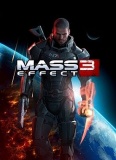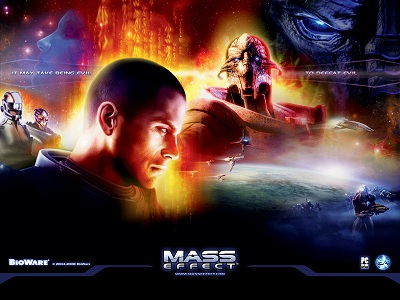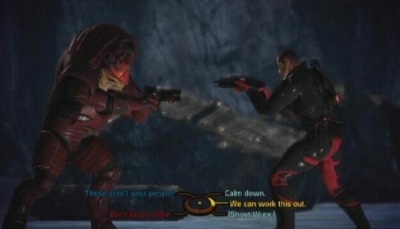Mass Effect
| Genre | Action role-playing, third-person shooter |
| Gamming Style | Single player, multiplayer |
| Platform | PC, Playstation 3, Xbox 360, Wii U, iOS, Android |
| Release Date | Mass Effect Series: |
| Developer | BioWare [3] |
| Publisher | EA Games, Microsoft |
| Website | Mass Effect |
Mass Effect is a trilogy of video games created by the studio, BioWare, and published by EA and Microsoft. The first game was released in 2007 for the Xbox 360 and and ported to PC in 2008, while the third game was released in 2012 for Xbox 360, PS3, and PC. The series is a scifi role playing game with elements of a space opera that follows the story of a male or female soldier and their place in a galactic struggle between organic and synthetic life. With over 10 million copies of the various games sold[4], the series was a commercial success and had high average reviews[5][6][7]. Called "easily the most enthralling space adventure that's ever been created for a video game platform,"[8] the game was praised for it's dynamic combat system, gritty/realistic feel, engaging characters and story, and epic scale[9]. Controversy has arisen over the games for the animated sexual scenes, the ability to play gay and lesbian characters, and Bioware's approach to the ending of the final game, which was so poorly received as to make an impact on Bioware[10]. Additional ethical concerns are apparent within the game's choice structure.
Contents
Plot
Mass Effect 1
The first game starts in the year 2183 with Commander Shepard, a human man or woman who is serving on a jointly human/alien controlled ship, the SSV Normandy. While investigating a distress signal on a human colony, Shepard discovers an army of AI, the feared Geth race, invading the planet. He eventually comes upon their target: a message from aliens 50,000 years extinct, the Protheans, warning of the imminent return of an ancient and near omnipotent force of inorganic beings they called Reapers that destroyed the Protheans' civilization and wiped out all advanced organic life. The game continues with Shepard chasing Saren, the primary pawn of the Reapers and an ex-agent of galactic law, as well as his Geth followers around the galaxy in an attempt to foil his attempt to allow the Reapers to reenter the Milky Way Galaxy.
Mass Effect 2
After succeeding in delaying the Reapers' plans of galactic invasion, the second game picks up two years later with an opening scene showing Commander Shepard's death. His/her later high-tech resurrection is performed by a rogue military group named Cerberus, whose goals aim to place humans above all other alien species. Cerberus reveals that human colonies around the Milky Way are disappearing, and the likely culprits are the same group of aliens who killed Shepard. Leading a mixed team of master scientists, assassins, soldiers, and more, Shepard discovers that this is indeed the case. These abductors, called the Collectors, are were left behind by the Reapers in order to carry out the mysterious process of Reaper procreation. Shepard works with Cerberus, either willingly or grudgingly, in order to put a stop to the abductions once and for all, and discovers that the Collectors are using the broken down organic material that composes humans in order to construct new Reapers, gigantic sentient spaceships. In the end of the game, Shepard stops the Collectors, destroys their base, and cuts ties with Cerberus, only to receive a message from the Reapers deep in space that they will arrive soon.
Mass Effect 3
The third game takes place shortly afterward, with the Reapers arriving on Earth and commencing with their galaxy wide slaughter of organic life. Shepard leads the efforts to both stop them and Cerberus, which seems bent on finding a way to control the Reapers, regardless of the cost. Commander Shepard gathers support around the galaxy, as well as helps construction on a Prothean weapon designed to destroy the Reapers. In the final phase of constructing and using the weapon, called the Crucible, it is revealed that the Reapers were created hundreds of thousands or even millions of years ago with the purpose of keeping organic life from creating AI that would destroy ALL life, rather than just advanced alien species. With this knowledge, Shepard is faced with the decision of whether to use the Crucible to destroy the Reapers, control them, or merge organic and inorganic life into a new, symbiotic form. The game finishes with a narrative which implies that the entire trilogy is a historic story being told by an adult to a child.
Game Design
Mass Effect operates as a role-playing game, letting the player customize the appearance and first name of Commander Shepard, as well as giving the player the ability to gain a reputation throughout the game. This is mainly done through Mass Effect's use of a dialogue wheel in conversation scenarios, allowing the player to choose actions which yield consequences later in the game, affect their relationships to certain characters, and affect Commander Shepard's in-game reputation[11].
Mass Effect also employs a third-person shooter mechanics for a bulk of its gameplay. The player can assemble a team of two other characters to engage in a variety of different conflicts throughout the game. There is also a variety of powers to use to gain an advantage in these shooting conflicts. Bionics allow the player to use mystical forces to affect enemies, engineer specialists can strongly influence robotic enemies, and the soldier class can focus on becoming adept in the shooting mechanics[11].
Controversy and Ethical Implications
Man vs. Machine
One prominent theme of the series is the idea of man vs. machine, showing up in all three games.
In the first game, the most frequent antagonists are the Geth; AI created by an alien race, called the Quarians, originally as laborers. The first Geth were barely considered true AI but were networked intelligences; the more together the smarter they were. Eventually, some of the Geth began to show signs of sentience, such as questioning why they worked, and the Quarians attempted to shut them down/destroy them. The Geth started fight back, and eventually succeeded in pushing the Quarians off their home world. This event shaped galactic view of AI, outlawing their creation and even existence, with the Geth seen as AI boogey-men. When the Geth encountered Saren prior to the events of the first game, many followed him, seeing the Reapers as robotic "gods". They chose to assist the Reapers in the attempts to exterminate advanced organic life in return for access to Reaper technology.
In the second game, new insight is given into the nature of the Geth, how a faction didn't accept the logic of the Reapers. These Geth seek to help organic life, and send an agent to help Shepard in his fight against the Collectors. The Collectors themselves are discovered to be the heavily bio-engineered and cybernetically enhanced remnants of the Protheans; now little more than tools used by the Reapers.
The alien and "other" Reapers, the Geth, machines that turned on their creators, and the once organic and free-willed Collectors. The game presents these elements in almost a Butler-like fasion; with man locked in a struggle against machine and machine's children, which are neither man nor machine.[12]
Of important note, when considered with Luciano Floridi's ideology[13] in mind, is that all of these entities are not only considered full moral agents, they are considered living. Though they may not fit within reality's definition of life[14], they are frequently referred to as "synthetic lifeforms" and less frequently as "inorganic lifeforms".
Choice
Throughout all three games, the player, in the role of Shepard, is faced with choices. The ability of the player to make choices that actually impact elements of the games was, in general, well received by players and heavily advertised by BioWare. A record of the most important choices in preceding games can even be transferred to proceeding ones, putting further emphasis on choice as a key element.
The decisions that make an impact on the game fall within two categories defined by BioWare: either Paragon or Renegade. Paragon represents "compassionate and heroic actions"[15] while renegade represents "apathetic and ruthless actions"[15]. While most of the renegade and paragon options in the game fit these two descriptions, some where far more morally ambiguous[16]. For example, in the second game the player must choose between forcing the last of the hostile Geth to side with the friendly, the paragon option, or destroy them, the renegade one. The question of morality, however, arises because the paragon option actually robs the Geth of their free will; Shepard releases a computer virus into the Geth network that makes them disagree with the Reapers' logic. BioWare makes the judgment that mass destruction is more "renegade" than the removal of free will, but players may not agree. forcing them to create new ethical justifications and views for the virtual environment.
This system also allows players to explore ethical paths that they wouldn't in reality, and create new ethical justifications and views for the virtual environment of the game. Some player's virtual ethics clashed with their personal ethics, however, such as in the case mentioned during an interview with a writer of Mass Effect 2,
"When Mass Effect 2 shipped, someone got hold of a store copy had broken the street date by a day. He was broadcasting his playthrough online, and a bunch of people were watching him and commenting in a little chat room attached to his video stream. He was doing a serious Renegade Shepard playthrough — every Renegade option, every time — and people were cheering as he shot half the characters and generally took the most Renegade option on every mission. And then he got to Tali’s loyalty mission. When the big reveal came, and Tali begged Shepard not to turn over the evidence that would exonerate her but brand her father a war criminal, the chat room went crazy. Everyone started saying, 'Wait, dude, don’t do it! Hang on, man, be cool, you can’t do that to her!' The guy gets to the trial, hits the dialog option, and as the chat room goes crazy with people yelling for him not to do it, he pauses and then types: 'I don’t know what to do, guys. I don’t want to hurt Tali.'"[17]
It appeared that though player had created a particular ethical code for their Shepard, their invested concern in the Tali character made him treat her differently; he viewed Tali as something beyond just a game element, a tool of entertainment, and so was unable to decide whether he should apply his personal ethical code or the virtual one he constructed.
Romantic Relationships
The option for Shepard to have a romantic relationship with an NPC, or non-player character, is a component of all three Mass Effect games. Seen as a way to increase the reality, emotional impact, and amount of choice in the games, these relationships have caused controversy since the release of the original Mass Effect [18]. Critics raised concerns over the sex scenes that were possible to view in the game[18], as well as the fact that one of the scenes was between a female Shepard and a female alien[18]. Defenders of the game called the scenes "tame" in comparison to basic cable T.V. ads[18].
Mass Effect 3 added the option to play as a male Shepard and romance one of two possible male NPCs, renewing the onslaught of criticism[19]. This affected the game's ratings shortly after its release, with people commenting that the gay romance options were one of their primary reasons for rating low[19]. Though the game's ratings greatly rose eventually, EA also received thousands of letters petitioning them to change their policy on LGBT content in their games[20]. Many of the letters were found to have been sent by a single organization[20].
Critical Reception of Final Ending
Called brief, confusing, under-developed, full of plot holes, lore breaking, core-theme discarding, and streamlined, the ending of Mass Effect 3 was extremely poorly received among fans and critics alike[21]. Introducing "an almost literal deus ex machina"[22], the ending attempted to explain the motivations behind the Reapers in a way that was both confusing unsatisfying for the majority[21]. Beyond that, the final choice offered to players changed the outcome of the game minutely, leading many players to feel cheated and empty[21]. This was magnified greatly due to the fact that players' choice was such an important theme in the games, as well as BioWare's many claims of that the ending would be the "end of an emotional story unlike any other" and "the decisions you make completely shape your experience and outcome[23]."
The backlash from the reception of Mass Effect 3 was so extreme as to cause BioWare to be voted the "Worst Company in America"[24], initiate the creation of a petition and charity with the goal of getting the ending changed[24], and drive a fan to attempt to sue BioWare on the basis that their claims about the game in advertisements were lies[25]. BioWare responded to the negative feedback by not only announcing that they would release a free "extended-cut" downloadable addition to the game, but also by releasing additional content that they had intended to sell, for free instead[26].
The passionate anger expressed by fans over the ending was of a very rare scope[27], and the reaction by BioWare to go back and attempt to rectify their game, completely for free, is a totally unique occurrence in the video game industry[28].
See Also
References
- ↑ IGN.com: Mass Effect
- ↑ Wikipedia: Mass Effect 2
- ↑ 3.0 3.1 Wikipedia. "Bioware" http://en.wikipedia.org/wiki/Bioware
- ↑ Mass Effect: A Sales History, William D'Angelo, 17 April 2012 www.vgchartz.com
- ↑ Mass Effect Website: Xbox360 www.ign.com
- ↑ Mass Effect 2 Website: PS#www.metacritic.com
- ↑ Mass Effect 3 review, Tom Francis, 6 March 2012 www.pcgamer.com
- ↑ Mass Effect Website: Xbox360 www.metacritic.com
- ↑ Mass Effect 2 Website www.ign.com
- ↑ Wikipedia: Mass Effect Reception
- ↑ 11.0 11.1 VanOrd, Kevin. “Mass Effect Review.” GameSpot, www.gamespot.com/reviews/mass-effect-review/1900-6183119/.
- ↑ Wikipedia: Darwin among the Machines
- ↑ Floridi, Luciano. Information and Computer Ethics. Cambridge University Press. Cambridge, UK. 2010.
- ↑ Freeman, Scott. Biological Science. Pearson Education Inc. San Francisco, CA. 2011.
- ↑ 15.0 15.1 Mass Effect Wiki: Morality
- ↑ ‘You Talk Too Much…’, Phillip Lobo, 2010 www.openlettersmonthly.com
- ↑ Facebook Friday Week 10 – Patrick & Karin Weekes, Evil Chris Priestly, 18 February 2011 blog.bioware.com
- ↑ 18.0 18.1 18.2 18.3 Conservative Site Charges "Explicitly Graphic Sexual Intercourse" in Mass Effect, 11 January 2008 gamepolitics.com
- ↑ 19.0 19.1 The Bizarre Reaction to Mass Effect 3 On Metacritic, Erik Kain, 6 March 2012 www.forbes.com
- ↑ 20.0 20.1 ‘Mass Effect 3’ Gay Sex Controversy: EA Defends Itself Against Anti-Gay Campaign, Vinod Yalburgi, 10 April 2012 www.ibtimes.co.uk
- ↑ 21.0 21.1 21.2 Mass Effect 3 Ending-Hatred: 5 Reasons The Fans Are Right, Ross Lincoln, 13 March 2012www.gamefront.com
- ↑ It's all too much: Why Mass Effect 3's Extended Cut ending can't possibly fix everything, Rowan Kaiser, 29 June 2012 www.joystiq.com
- ↑ Did Bioware actually lie about the ending to Mass Effect 3?, Kyle Orland, 11 April 2012 arstechnica.com
- ↑ 24.0 24.1 Bioware to Extend ‘Mass Effect 3′ Ending, Pacify the Mob, Jared Newman, 5 April 2012 techland.time.com
- ↑ Enraged fan claims Mass Effect 3 ending was 'false advertising', Matt Liebl, 19 March 2012 www.gamezone.com
- ↑ To Mass Effect 3 Players, From Dr. Ray Muzyka, co-founder of BioWare, Darklarke, 21 March 2012 blog.bioware.com
- ↑ Why Fans Are So Angry About the Mass Effect 3 Ending, Dave Thier, 14 March 2012 www.forbes.com
- ↑ Mass Effect 3 Extended Cut: The fans won. Or did they?, Ben Griffin, 26 June 2012 www.computerandvideogames.com




